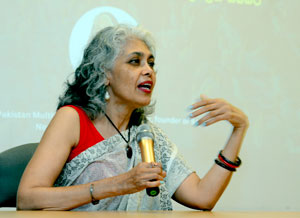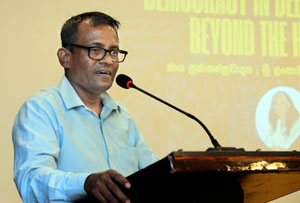Sunday Times 2
Democracy in Debt: Sri Lanka – Beyond the Headlines
View(s):By Sandun Jayawardana
The Sinhala adaptation of award-winning Pakistani journalist Beena Sarwar’s English-language documentary ‘Democracy in Debt: Sri Lanka – Beyond the Headlines,’ was screened at the Sri Lanka Press Institute on Wednesday (July 30). The documentary has been translated and produced in Sinhala by journalist Priyantha Pradeep Ranasinghe under the title ‘Naya Prajaathanthrawaadaya: Sri Lankawa – Sirasthalawalin Obbata.’

Beena Sarwar
The original 25-minute documentary, which was produced in English with support from the Pulitzer Centre in the United States, was filmed both in Colombo and the rural village of Dutuwewa ahead of last year’s presidential election. In Ms Sarwar’s words, the documentary provides “a multi-layered narrative about the universal challenges of governance, accountability, and the enduring spirit of democratic aspirations — relevant beyond Sri Lanka to India, Bangladesh, the USA, and wherever people are struggling to uphold democracy and accountability.” The documentary has been a critical success, with screenings at more than 70 venues in nearly 20 countries across five continents.
Beena Sarwar, who is a Pakistani multimedia journalist, editor and documentary film-maker currently based in the US, was present at the screening. She later participated in a lively Q & A session where she answered questions ranging from the strengths and failings of democracy to the parallels she sees between the situation in Sri Lanka, her native Pakistan and other countries. Ms. Sarwar said her original idea had been to do several print stories after observing Sri Lanka’s recovery process from the economic crisis. However, her friend Dr SinhaRaja Tammita-Delgoda, who had been to Dutuwewa, had suggested that she do a documentary instead focusing on the village, situated in the country’s farming heartland, as this was an area most foreign journalists who come to Sri Lanka ignore. Dr Tammita-Delgoda was involved in the original documentary as production consultant, co-director and co-writer. It was he who reached out to Mr Ranasinghe to translate the documentary into Sinhala.
Responding to a question on whether the democratic system has made problems in countries such as Sri Lanka and Pakistan worse, she opined that even with all its failings, there is still no better system. “If we want people’s representation, at this point, there is no other system in the world that gives us some kind of representation to the people,” Ms Sarwar said of democracy, quoting late Pakistani Prime Minister Benazir Bhutto, that “democracy is the best revenge.”

Priyantha Pradeep Ranasinghe Pix by Indika Handuwala
Having been translated into Sinhala, the documentary can now reach a far wider audience in Sri Lanka. Addressing the event, journalist Priyantha Pradeep Ranasinghe said he aims to hold screenings of the Sinhala version of Ms Sarwar’s documentary and explore how Sri Lankans too can produce such international-level documentaries. This week, the Sinhala version of the documentary was screened to students of the Sri Jayewardenepura University, followed by a panel discussion. Another screening was held at the Department of Government Information, with Minister of Mass Media and Health Dr Nalinda Jayatissa and senior officials from the Media Ministry and state television channels in attendance. He also said there are plans to hold a screening of the Sinhala version of the documentary for the villagers in Dutuwewa soon.
The project was a first for Mr Ranasinghe, who, despite having over 20 years’ experience in print, electronic and digital media, had not been involved in translating an international documentary before. “From what I understand, this is the first time an international documentary has been produced in Sinhala,” he noted. The experience of working on the documentary has also made him become interested in documentary filmmaking, he confessed. He pointed out that not many journalists in Sri Lanka engage in documentary filmmaking, and expressed hope that more journalists would be encouraged to engage in filmmaking as well.

